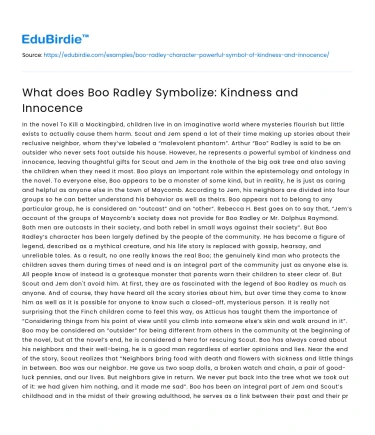In the novel To Kill a Mockingbird, children live in an imaginative world where mysteries flourish but little exists to actually cause them harm. Scout and Jem spend a lot of their time making up stories about their reclusive neighbor, whom they’ve labeled a “malevolent phantom”. Arthur “Boo” Radley is said to be an outsider who never sets foot outside his house. However, he represents a powerful symbol of kindness and innocence, leaving thoughtful gifts for Scout and Jem in the knothole of the big oak tree and also saving the children when they need it most. Boo plays an important role within the epistemology and ontology in the novel. To everyone else, Boo appears to be a monster of some kind, but in reality, he is just as caring and helpful as anyone else in the town of Maycomb.
According to Jem, his neighbors are divided into four groups so he can better understand his behavior as well as theirs. Boo appears not to belong to any particular group, he is considered an “outcast” and an “other”. Rebecca H. Best goes on to say that, “Jem’s account of the groups of Maycomb’s society does not provide for Boo Radley or Mr. Dolphus Raymond. Both men are outcasts in their society, and both rebel in small ways against their society”.
Save your time!
We can take care of your essay
- Proper editing and formatting
- Free revision, title page, and bibliography
- Flexible prices and money-back guarantee
But Boo Radley’s character has been largely defined by the people of the community. He has become a figure of legend, described as a mythical creature, and his life story is replaced with gossip, hearsay, and unreliable tales. As a result, no one really knows the real Boo; the genuinely kind man who protects the children saves them during times of need and is an integral part of the community just as anyone else is. All people know of instead is a grotesque monster that parents warn their children to steer clear of. But Scout and Jem don't avoid him. At first, they are as fascinated with the legend of Boo Radley as much as anyone. And of course, they have heard all the scary stories about him, but over time they come to know him as well as it is possible for anyone to know such a closed-off, mysterious person. It is really not surprising that the Finch children come to feel this way, as Atticus has taught them the importance of “Considering things from his point of view until you climb into someone else’s skin and walk around in it”. Boo may be considered an “outsider” for being different from others in the community at the beginning of the novel, but at the novel’s end, he is considered a hero for rescuing Scout. Boo has always cared about his neighbors and their well-being, he is a good man regardless of earlier opinions and lies. Near the end of the story, Scout realizes that “Neighbors bring food with death and flowers with sickness and little things in between. Boo was our neighbor. He gave us two soap dolls, a broken watch and chain, a pair of good-luck pennies, and our lives. But neighbors give in return. We never put back into the tree what we took out of it: we had given him nothing, and it made me sad”.
Boo has been an integral part of Jem and Scout’s childhood and in the midst of their growing adulthood, he serves as a link between their past and their present. Once an imagined enemy and a source of supposed danger, Boo transforms into a true friend and ally, helping them at crucial moments in their transformation from childhood to maturity. From this, Jem and Scout see that once again, Boo is indeed a hero. Contrary to Best’s statement, that “Members of one group who reach out to members of another group will be pushed out of the system altogether or dealt with harshly within the system”, Scout chooses to reach out to Boo and see things from his point of view all while realizing that he is human just like her. After taking Boo home, Scout comes to the realization that “Just standing on the Radley porch was enough”.
If Boo were to belong to any category, he would perhaps demonstrate the best symbol of goodness. Boo progresses from being the starting point of childhood superstition to becoming increasingly real to Jem and Scout through his actions. Eventually, Scout realizes that “Boo’s children needed him” perhaps just as much as he needed “his children”. At the end of the novel, Boo becoming fully human to Scout shows that she has developed into a sympathetic and understanding young woman. Despite the hurt that Boo has endured; being ridiculed and shunned by the townspeople, the purity of his heart shines through with his kind actions towards the children as well as the town of Maycomb.






 Stuck on your essay?
Stuck on your essay?

